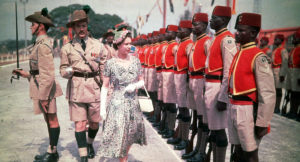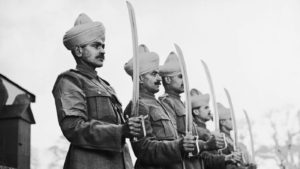Gandhi, poor fellow, had his ashes stolen on the 150th anniversary of his birth. “Traitor”, scrawled the Hindu supremacist malcontents on a life-size cut-out of the Mahatma at the mausoleum. That was a couple of years ago, but it’s a sentiment that’s grown shriller since. Unsurprisingly. In government as in schools, in newsrooms as on social media, the founding father’s defenders are being put out of business by his detractors. His Congress Party, after 50 years of near-uninterrupted rule since independence in 1947, is now in ruins, upstaged by the Bharatiya Janata Party. Hindu supremacists have stolen the show, while India’s Muslims, Christians, and Dalits are persecuted. With the changing of the guard, Gandhi’s extravagant ideal — unity in diversity — has gone the way of his ashes.
His reputation, too, is in tatters. Last year, the National Theatre staged a play about his assassination. But The Father and the Assassin centred not on Gandhi but Godse, the man who killed him 75 years ago this week. Here is a tender portrait of a tortured soul, a blushing boy raised as a girl to propitiate the gods who had taken away his three brothers, who becomes radicalised and blames Gandhi for betraying Hindus and mollycoddling Muslims, so causing Partition. It is no accident that Godse was a card-carrying Hindu supremacist, a member of the parent organisation of the BJP, to which India’s new ruler Narendra Modi belongs. Today, statues of Godse are going up across the country just as statues of Gandhi are being pulled down across the world.
Needless to say, this is a most disturbing development. Yet the reaction of liberals, Indian as well as Western, has been no less troubling. An unthinking anti-imperialism of old has joined up with an unthinking anti-Hindu supremacism of new to beget a bastardised Gandhi. What we have is not a creature of flesh and blood, possibly a great if also flawed man, but rather a deified hero. This is the Gandhi with a saintly halo around him who greets you from Indian billboards, grins at you from rupee notes, stares down at you from his plinth on Westminster’s Parliament Square, and, in Ben Kingsley’s portrayal of him, slathered in a thick impasto of fake tan, moves you to a standing ovation.
This is the easily comestible fortune-cookie Gandhi you encounter in airport bestsellers such as Ramachandra Guha’s double-decker hagiography, and also the sartorial icon whose wire-rim glasses were emulated by Steve Jobs. There is the Gandhi of the gags, most famous for a retort he probably never made: asked what he thought of Western civilisation, the Mahatma is reported to have replied: “I think it would be a good idea.” Ba-dum ching! Then there’s the Christological Gandhi, a modern messiah turning the other cheek: “An eye for an eye leaves the whole world blind.” There’s also Gandhi the self-help guru: “Be the change that you wish to see in the world.” One could go on.
Here’s where the historian in me says, would that it were so simple. Gandhi was no liberal. And if those who sing his praises today knew a little more about Gandhi the man, rather than Gandhi the saint, their adulation would very quickly dry up. The fact is that the Mahatma hasn’t aged well. He detested democracy, defended the caste system, and had a deeply disturbing relationship with sex.
None of this should surprise us. Unlike some of the more cerebral thinkers of his cohort, figures such as Ambedkar and Periyar, Gandhi possessed a shallow mind. The product of a rather parochial education, admittedly the best that could be bought in turn-of-the-century western India, he struggled to juggle academic and conjugal demands. His precocious marriage to Kasturbai at 13 was a mésalliance, perennially troubled by his suspicions of her infidelity. Not the sharpest knife in the drawer, he dropped out of Samaldas College. It was only in London, where he went to read law, that his horizons widened.
Then again, not for the better. For Gandhi’s London was the batty milieu of late-Victorian cranks, all self-abnegation and séances, familiar to us from George Bernard Shaw’s satirical sketches of his contemporaries. We also get a glimpse of it in Kathryn Tidrick’s remarkable intellectual biography of Gandhi, by far the best. His friends were frankly a bizarre bunch: theosophists and esotericists, magnates and men of leisure, ever experimenting with unconventional lifestyles and food fads. An early influence was the president of the London Vegetarian Society, A.F. Hills. A battleship manufacturer, Hills was of the opinion that celibacy and a suitably rarefied diet mostly consisting of uncooked food could lead to self-divinisation, thus rendering all manner of conflict redundant. Political parties and trade unions would wither away. Strikes and lockouts would become distant history. Politics as we know it would cease to exist. That would be the day when smug, enlightened chaste vegetarians such as himself would lord it over society.
This was the worldview Gandhi carried into his career. Mass democracy was unwholesome, he felt — even imperialism infinitely preferable to the tyranny of the majority. The correct way of organising society was to have enlightened men representing different faiths come together and hammer out a moral compact, rather than battle it out on the hustings.
Accordingly, throughout the Twenties and early Thirties, he held the Congress Party in a vice-like grip. Proceeding at glacial pace, decolonisation was a slow, largely elite affair, dominated by parleys with Brits in exotic locales, never forgoing the niceties of wit and repartee. Every now and then, about once a decade, the rabble were summoned in a show of strength. But beyond that, the people were surplus to requirements. Gandhi always called off mass movements when it appeared that the truculent masses were getting ahead of themselves.
Gandhi, then, could be quite the uppity aristocrat. Preaching the gospel of disengaged action, he exhorted people to mindlessly spin cloth, take up fasting, and embrace celibacy. So carried away was he by his renunciatory rhetoric that he concocted a defence of slavery. Sure, slavery was bad for the master, who was reduced to a state of dependency, he argued, but it was, counterintuitively, good for the slave, who ennobled himself through his great act of self-sacrifice.
The valorisation of self-sacrifice also led Gandhi to offer the following advice to Jews in the Holocaust: “the Jews should have offered themselves to the butcher’s knife. They should have thrown themselves into the sea from cliffs… As it is, they succumbed anyway in their millions.” Brits were told much the same thing: “let them [the Nazis] take possession of your beautiful island. Allow yourself to be slaughtered, but refuse to owe allegiance to them.” Women were offered similar counsel: do not resist rape; appeal instead to the assailant’s sense of virtue through passivity. As the historian Faisal Devji has it in The Impossible Indian, Gandhi could tolerate any number of deaths to secure his moral objectives. This was the crux of his non-violence: killing was evil, but dying was heroic. The death cult, however, was reserved for lesser mortals. For himself, Gandhi fancied a long life, hoping to live to be 125.
Predictably, many subalterns did not take kindly to being used as cannon fodder to defend a higher cause. They found his defence of the caste system — “we have to earn our bread by following [our] ancestral calling” — particularly grating: it was all very well to decry social mobility when one sat close to the top of the caste pyramid, as Gandhi did. The Mahatma’s rejoinder, that those born low were simply paying for sins from a previous life, they found understandably unconvincing. They also took umbrage at his disapproval of intermarriage and interdining between lower and higher castes, between Hindus and Muslims.
The strong opinions Gandhi developed on the subject of race in South Africa, where he spent two decades to 1915, were an early harbinger of his unforgivingly hierarchical mind. Brown Asians were “infinitely superior” to black Africans. The plague outbreak in Durban would persist, he argued in 1905, so long as both communities were “herded together indiscriminately” in hospitals. Segregation was needed. It is on account of such views that students and staff at the University of Ghana had Gandhi’s statue on their campus removed.
Gandhi Must Fall and Rhodes Must Fall, then, point to a common theme. History has no heroes, and nor should we look for them. Just like his arch-imperialist contemporary, the nationalist icon is “problematic” — to use a word beloved of a certain generation.
Counterpointing the reverential tones of Richard Attenborough’s biopic, we have another portrayal of the Mahatma, perhaps all too brief, in Weird Al Yankovic’s UHF, also made in the Eighties. This is not the historical Gandhi, of course, but “Gandhi II”: “No more Mr Passive Resistance, he’s out to kick some butt”, an American baritone television announcer intones, as we get footage of the Mahatma thrashing baddies, ordering a steak (“medium rare”), and seducing women.
It’s cheerful nonsense, of course, but it hits closer to home than intended. No, Gandhi did not mow down villains, but he did enjoy outré sexual antics — most perversely, perhaps, sleeping naked with his 16-year-old grandniece, also naked. “Experiments”, he called them. Tests of his celibate resolve. Given contemporary sensibilities, we might beg to differ. One man’s “experiment” is another man’s grooming. Now, UHF didn’t set out to plumb the darker depths of human nature, but it is, at least, a worthy antidote to apotheosis.
Disclaimer
Some of the posts we share are controversial and we do not necessarily agree with them in the whole extend. Sometimes we agree with the content or part of it but we do not agree with the narration or language. Nevertheless we find them somehow interesting, valuable and/or informative or we share them, because we strongly believe in freedom of speech, free press and journalism. We strongly encourage you to have a critical approach to all the content, do your own research and analysis to build your own opinion.
We would be glad to have your feedback.
Source: UnHerd Read the original article here: https://unherd.com/




